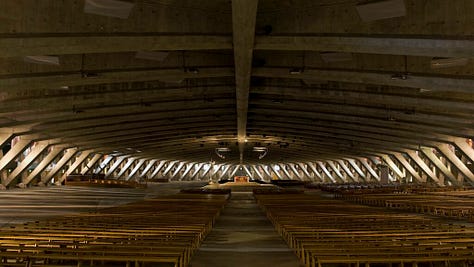I don’t know how many of you watched the Oscars last week (statistically, not many), but you may have heard anyway that Adrien Brody won the Best Actor award for a movie called The Brutalist. As the title implies, he played a Brutalist architect. If you don’t know what Brutalist architecture is, picture the worst building you can imagine.
That’s Brutalism.
For reasons beyond my comprehension, this became a common style of church over the last 80ish years. On our pilgrimage to Lourdes, we learned they have three basilicas—two beautiful (The Basilica of the Immaculate Conception & The Basilica of Our Lady of the Rosary); and one brutalist: the Basilica of St. Pius X.



Seeing them right next to each is quite striking. It is, and I say this without exaggeration, borderline heretical to build a church in the Brutalist style.
Think that’s an overstatement? Read
’s piece, “Why this church wants to hurt you” on her Substack, .None of that has anything to do with today’s readings. It was just on my mind, so I thought I’d share.
Reading I
Dt 26:4-10
Moses spoke to the people, saying: “The priest shall receive the basket from you and shall set it in front of the altar of the LORD, your God. Then you shall declare before the Lord, your God, ‘My father was a wandering Aramean who went down to Egypt with a small household and lived there as an alien. But there he became a nation great, strong, and numerous. When the Egyptians maltreated and oppressed us, imposing hard labor upon us, we cried to the LORD, the God of our fathers, and he heard our cry and saw our affliction, our toil, and our oppression. He brought us out of Egypt with his strong hand and outstretched arm, with terrifying power, with signs and wonders; and bringing us into this country, he gave us this land flowing with milk and honey. Therefore, I have now brought you the firstfruits of the products of the soil which you, O LORD, have given me.’ And having set them before the LORD, your God, you shall bow down in his presence.”
A popular misconception of the Exodus story is that the Israelites escaped Pharaoh, and then wandered in the desert for forty years. That’s not what happened. In fact, they arrived at its borders within a few months. Moses sent twelve spies to scout the land of Canaan, and they returned with news that their cities were heavily fortified and protected by giants.
Thus, the “people” Moses is speaking to in today’s reading aren’t the Israelites who fled Egypt. Those people saw the Ten Plagues, the parting of the sea, the pillar of smoke and fire guiding them home, and then, right on the border of the promised land…they decided not to trust God. They feared the Nephilim more than they trusted God.1
So God turned them around, and then the Israelites wandered in the desert for forty years. That whole generation (with the exception of Joshua and Caleb, the two spies who argued they could conquer Canaan) died without ever crossing the Jordan River.
Israel had to wander in the desert, in order to purify themselves, remove any doubt and weakness. They had to learn to trust in God’s providence. That’s why we have forty days of Lent, too—to remove all the unnecessary impurities from our lives before celebrating Christ’s resurrection on Easter.
Responsorial Psalm
Ps 91:1-2, 10-11, 12-13, 14-15
R. (cf. 15b) Be with me, Lord, when I am in trouble.
You who dwell in the shelter of the Most High,
who abide in the shadow of the Almighty,
say to the LORD, “My refuge and fortress,
my God in whom I trust.”
R. Be with me, Lord, when I am in trouble.
No evil shall befall you,
nor shall affliction come near your tent,
For to his angels he has given command about you,
that they guard you in all your ways.
R. Be with me, Lord, when I am in trouble.
Upon their hands they shall bear you up,
lest you dash your foot against a stone.
You shall tread upon the asp and the viper;
you shall trample down the lion and the dragon.
R. Be with me, Lord, when I am in trouble.
Because he clings to me, I will deliver him;
I will set him on high because he acknowledges my name.
He shall call upon me, and I will answer him;
I will be with him in distress;
I will deliver him and glorify him.
R. Be with me, Lord, when I am in trouble.
This is the psalm Satan quotes in today’s Gospel, which is about as clear an example as one could ask for that scripture doesn’t “interpret itself,” as some sola scriptura advocates would put it. We need guidance when interpreting the Bible, or we might be tricked by agents of the Devil when this or that verse is taken out of context.
Reading II
Rom 10:8-13
Brothers and sisters: What does Scripture say? The word is near you, in your mouth and in your heart —that is, the word of faith that we preach—, for, if you confess with your mouth that Jesus is Lord and believe in your heart that God raised him from the dead, you will be saved. For one believes with the heart and so is justified, and one confesses with the mouth and so is saved. For the Scripture says, No one who believes in him will be put to shame. For there is no distinction between Jew and Greek; the same Lord is Lord of all, enriching all who call upon him. For “everyone who calls on the name of the Lord will be saved.”
Here, we see an example of the correct way of using scripture. Paul quotes or alludes to know less than eight separate passages in just these six verses. He builds his argument off a wide variety of sources. Deuteronomy, Isaiah, Joel, along with the Acts of the Apostles and Paul’s own epistles all reinforce each other. To truly understand God’s word, the Bible must be taken as a whole—which Jesus will demonstrate in today’s Gospel.
Verse Before the Gospel
Mt 4:4b
One does not live on bread alone,
but on every word that comes forth from the mouth of God.
The word “alone” is important here. We still need to eat! (At least, in this life.) If we didn’t, fasting wouldn’t be any kind of sacrifice.
Gospel
Lk 4:1-13
Filled with the Holy Spirit, Jesus returned from the Jordan and was led by the Spirit into the desert for forty days, to be tempted by the devil. He ate nothing during those days, and when they were over he was hungry. The devil said to him, “If you are the Son of God, command this stone to become bread.”
Jesus answered him, “It is written, One does not live on bread alone.”
Then he took him up and showed him all the kingdoms of the world in a single instant. The devil said to him, “I shall give to you all this power and glory; for it has been handed over to me, and I may give it to whomever I wish. All this will be yours, if you worship me.”
Jesus said to him in reply, “It is written You shall worship the Lord, your God, and him alone shall you serve.”
Then he led him to Jerusalem, made him stand on the parapet of the temple, and said to him, “If you are the Son of God, throw yourself down from here, for it is written: He will command his angels concerning you, to guard you, and: With their hands they will support you, lest you dash your foot against a stone.”
Jesus said to him in reply, “It also says, You shall not put the Lord, your God, to the test.”
When the devil had finished every temptation, he departed from him for a time.
On the first Sunday of Lent, we read a different version of the Temptation in the Desert, depending on the lectionary cycle—Matthew’s in Year A, Mark’s in Year B, and since we are currently in Year C, we’re reading Luke’s. Matthew’s and Luke’s are similar, but the specific temptations are in a different order.
Luke is focusing on Jesus’ journey from the barren wastelands to His Father’s house, the Temple. Like the ancient Israelites, this happens after a period of purification in the desert. Unlike the Exodus story, this time isn’t described in scripture. Jesus is alone during His fast—not even the evangelist can join Him.
But He’s never truly alone. By stripping away everything, Jesus can more fully join Himself to the Father.
Satan mistakenly thinks the time of solitude will weaken Jesus, and only begins his temptations at the end. But his plan backfires—Jesus rebuffs every temptation.
It’s worth noting how this story emphasizes Jesus’ fully human nature. After fasting forty days, He’s hungry. Yet when Satan tempts him to perform miracles like magic tricks, Jesus refuses. He doesn’t use any supernatural powers to overcome the temptations; He remains sinless as a human being.
I think sometimes we can get lost in the weeds of interpreting the meaning of the specific temptations. Although the symbolism can be quite rich; if you’re interested, you should read
’s post on this morning—But there’s a danger of missing the forest for the trees. (Remember that Mark doesn’t describe the specific temptations at all in his gospel.) The overall point is how grand the Devil’s offers are. As discussed just last Monday, the rich and powerful experience temptations that most of us will never face.2 No one is more powerful than Jesus, so Satan must tempt Him with everything. But Jesus refuses, in part because everything is already His.
How can this apply to us? We’re not powerful, like Jesus. Satan’s temptations in our lives are relatively minor. But consider what Jesus promises—3
For whoever wishes to save his life will lose it, but whoever loses his life for my sake will find it. What profit would there be for one to gain the whole world and forfeit his life? Or what can one give in exchange for his life?
By “giving up something for Lent,”—through fasting, prayer, and almsgiving—we’re more able to ignore the meager, worldly things Satan offers, and focus exclusively on Jesus.







